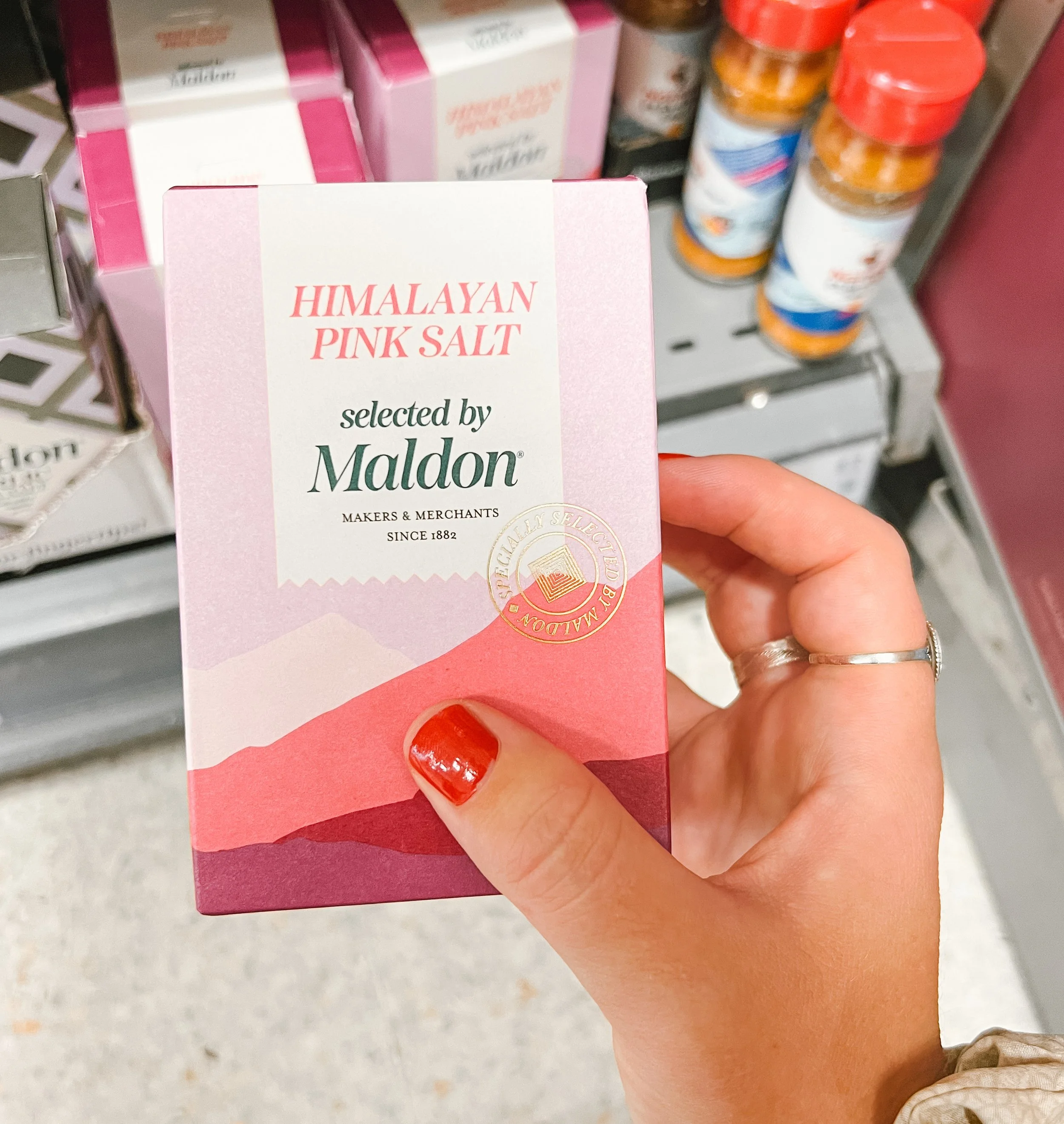Salt in babies: what is currently recommended?
Salt in babies: what is currently recommended? From a HCPC registered paediatric dietitian and nutritionist Christina Hills
Most guidelines recommend removal of all salt- including salt added during cooking- from a babies weaning diet. The reasons stated include: immature kidneys, risk of hypertension in later life and to avoid preference for salty tastes. However, a recent review highlighted there are definitely gaps in the research and very little to back up some of these claims around advising a blanket no salt when weaning (Yang + Wang 2023)
Are there any risks of the current guidelines?
Generally it is recommend to follow a whole food diet based on fresh and unprocessed foods including a range of fruits and vegetables, unprocessed meat and fish, with whole grains, pulses and legumes. A small amount of salt added during cooking or using a fresh or low salt stock is common practice for many families who abide by these healthy eating practices. By following the current blanket no-added salt guidelines many babies may have to have separate meals prepared for them which may create an extra burden during the weaning process.
Studies that have looked at where salt (or sodium) comes from in our diets generally find that only a small proportion comes from natural sources or from what we add to our food whilst cooking.
So if the salt in our diet isn’t coming from salt added during cooking, where is it coming from? Most of the salt in our diet comes from hidden sources like processed foods, and studies have shown this is also true for babies.
Common contributors to higher salt intakes in babies are:
-Bread
-Cheese
-Breakfast cereals
-Soups
-Gravies
-Yeast extract
(Cribb et al 2012, Campbell et al 2014)
So can babies eat salt: what does the research say?
So, what does the latest science say about salt and your baby’s health? In this article, I will look at three big topics:
Kidney health + salt
Taste preferences + salt
Long term blood pressure risk + salt
Salt and kidneys- The “Immature Kidney” story
The idea that salt damages infant kidneys comes from research in the early-to-mid 20th century. In one widely cited study, researchers gave newborns a very salty solution intravenously and found their kidneys couldn’t clear sodium as efficiently as adults. Understandably, those findings raised a concern- but these were newborn babies under three months old (and not babies ready to start solids) and they were also fed via an IV infusion which does not reflect real life feeding. In the modern world, babies this young aren’t eating salt at all- they’re exclusively on breastmilk or formula (Yang + Wang 2023)
Fast forward to today, and studies show that by around four months, healthy infants’ kidneys work much more like those of adults when it comes to handling sodium. So by the time your baby is ready for weaning (around six months), their kidneys have the capacity to manage small amounts of sodium and added salt in family meals. It’s also important to note that both breastmilk and formula milk contain salt’ to varying degrees! They also noted that babies aged 6-12 months do need some sodium, and by restricting sodium excessively in the diet they may even be at risk of sodium deficiency.
The 2023 review by Yang + Wang concluded that the “salt is bad for infant kidneys” advice for older babies is based on outdated studies that do not reflect real-life feeding. In short: for healthy babies over six months, the salt + kidney concern doesn’t hold up.
Early salt exposure and taste preferences- will they crave it for life?
Another common worry is that by giving salt early on to babies this “sets” your baby’s taste buds to prefer salty foods forever. One long-term study compared babies given a high-salt diet in their first five months with those given a low-salt diet (Whitten and Stewart 1980). When tested at both 8 months and at 8 years old, there was no difference in how much they liked salty foods. Taste preference is influenced by many things- genetics, repeated exposure to a wide range of flavours, and overall diet quality- not just whether babies have a pinch of salt in their first year. That said, I do feel it is important for babies to accustom themselves to the taste of food in its natural form, which includes a mixture of foods which are seasoned with herbs and mild spices, an occasionally small amounts of salt, but also plain whole foods which are not masked by the taste of additional flavourings.
Salt intake in babies and the future risk of high blood pressure
We know that too much salt in adulthood can raise blood pressure. But does a baby’s salt intake in the first year have any long-term effect?
Yang and Wang reviewed the available studies and found no reliable evidence that higher sodium in infancy leads to higher blood pressure in adulthood. Many of the studies which appeared to show a link, had methodological flaws such as introducing salt at an early age - such as 4 months - or they didn’t follow babies up for a long enough period of time.
That said, this doesn’t mean we should give babies very salty foods or add salt to meals in excess- as we know that diets HIGH in added salt can lead to high blood pressure. And remember, salt can hide in lots of foods, in particular processed foods. But if you’re starting solids around 6 months, there no evidence that completely avoiding added salt will protect against hypertension risk in the future. Other factors are also important to promote your child’s health, like overall diet quality, exercise, fruit and veg intake, and not whether your baby had a sprinkle of salt added to a healthy home cooked meal in infancy.
So, can babies eat salt?
I think the take away point here is that if a family consumes high levels of fast and processed foods, or lots of the foods higher in salt, then it is worth having a look at the diet and finding ways to cut down. But if a family meal is made from scratch from fresh whole foods like, veggies, salad, unprocessed fish or meat, and fresh whole grains, with a small amount of salt or a low salt stock added for taste this could be offered to a baby above the current recommended weaning age of 6 months.
But this isn’t to say go and add loads of salt to your meals, and if you can happily cook without it then continue to do so! There are also lots of other ways to add flavour to foods like fresh herbs and spices.
Be mindful of some other food additives in your kitchen which are high in salt:
-Stocks
-Soy sauce
-Gravies
Check the back of the packet of any processed foods and stocks and remember the current UK advice is less than 1g per day for babies under the age of 1!
References:
Yang, S. and Wang, H. (2023) ‘Avoidance of added salt for 6–12-month-old infants: A narrative review’, Archives de Pédiatrie, 30(8), pp. 595–599. doi:10.1016/j.arcped.2023.08.009 https://pubmed.ncbi.nlm.nih.gov/37805298/
Campbell et al 2014: Sources and correlates of sodium consumption in the first 2 years of life: https://pubmed.ncbi.nlm.nih.gov/25022834/
Whitten, C.F. and Stewart, R.A. (1980) ‘The effect of dietary sodium in infancy on blood pressure and related factors: studies of infants fed salted and unsalted diets for five months; measured at eight months and eight years of age’, Acta Paediatrica Scandinavica, 69(suppl 279), pp. 1–17.
Cribb et al 2012: Contribution of inappropriate complementary foods to the salt intake of 8-month old infants: https://pubmed.ncbi.nlm.nih.gov/21772314/
Salt in your diet (NHS): https://www.nhs.uk/live-well/eat-well/food-types/salt-in-your-diet/
World Health Organization (2003) Feeding and Nutrition of Infants and Young Children. WHO European Publication, ch.8, pp. 172–174.


